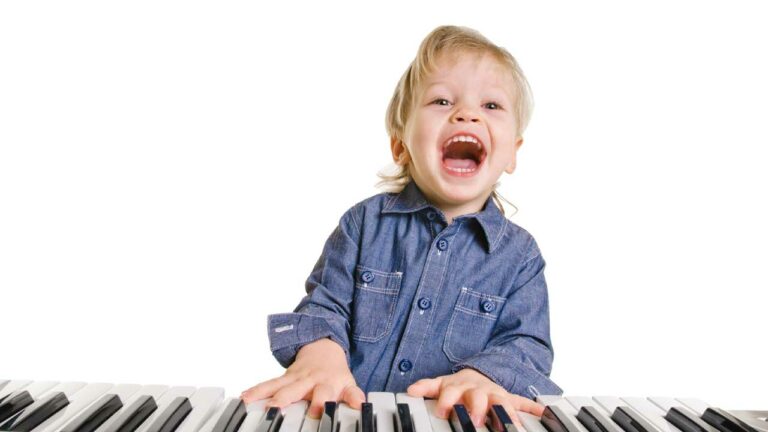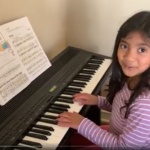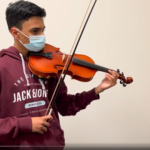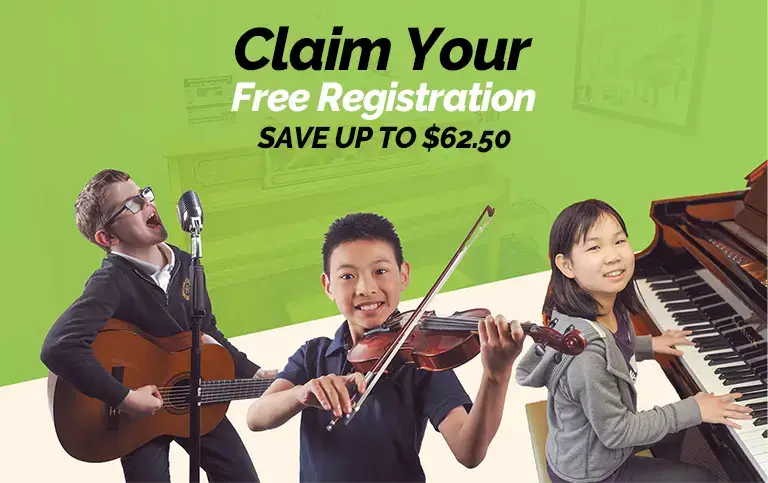
21 Developmental Benefits + 30 Questions parents ask about Piano Lessons
Unlocking Your Child's Creative Potential Through Piano Lessons
Learning the art of playing music, especially the piano, is one of the most beneficial ways to help your child mentally and emotionally develop. It is said to have many benefits that contribute to physical, mental health, and emotional development.
As a parent, you can provide your child with lifelong skills that will stay with them for years beyond their classroom studies.
Developmental Benefits
Creativity
Memory Skills
Patience & Discipline
Confidence & Self-Esteem
Coordination & Motor Skills
Socialization Skills
Express Emotions
Empathy & Compassion
Memory & Mental Alertness
Gratitude & Appreciation
Time Management
Creativity & Imagination
Self-Expression
Collaboration
Problem-Solving
Memory & Concentration
Creative Thinking
Self-Confidence
Listening & Concentration Skills
Perseverance
Brain Activity
21 Developmental Benefits For Younger Children Who Take Piano Lessons
1. Stimulates Creativity
Playing the piano requires creative thinking and problem-solving for students to fully comprehend musical pieces. Music can bring stories to life through sound; students exposed to music often excel at creative activities such as writing or drawing.
2. Enhances Memory Skills
Playing an instrument means memorizing notes and recalling the components of different songs. This exercise helps to boost memory recall because it teaches children how to learn patterns and recognize repeatable details while enhancing their ability to multitask and focus on multiple tasks at once, which aids in overall cognitive development, all while having fun!
3. Develops Patience & Discipline
Regular weekly piano lessons provide structure during which younger children must apply discipline to progress musically. They must practice independently between each class, developing patience as they learn more complex notes that may have taken weeks or even months to know perfectly.
4. Improves Confidence & Self-Esteem
Becoming accomplished at playing a musical instrument (or any activity) has been proven time and again to boost confidence and self-esteem in learners; this is especially true for young people as it opens a sense of accomplishment within them unrivaled by other academic pursuits such as math or science where answers are more straightforward/black-and-white than within expressionistic music creations through interpretation/understanding performance techniques etc.

5. Heightens Degrees of Coordination & Motor Skills
Particular movements related to pressing down black-and-white keys ensure young players remain agile throughout sessions since motor coordination plays an essential part when mastering hand positions correctly—the same applies if performers want swiftness/accuracy when playing specific passages with both hands simultaneously, thus raising degrees of overall control.
Regardless of how small, participating in group settings allows kids to become familiarized with environments foreign from the ‘norm,’ allowing inner strengths to show rather than converting into ‘shy’ mode due to pressures derived from peer influence usually experienced in classrooms.
Piano tutors understand the necessity of creating social atmospheres whereby participants, happy turning up week after week, feel like site belonging while learning, further enhancing enjoyment felt playing itself, enabling strong bonds to build friendships based around a shared passion, leading unification amongst all students attending sessions.
7. Learns To Express Emotions
Piano lessons provide an outlet for children to express emotions through music which they may not be able to verbalize in other ways or settings – this helps them develop their emotional intelligence, allowing them to better comprehend and regulate their feelings while developing empathy toward others. This can be beneficial at home and school when dealing with complex topics or moments.
Google Reviews
The school is amazing everyone is very kind and always caring. The teachers are always very kind. Great school overall.
The teachers are very talented and dedicated even if they are on online learning at times. My family members are delighted to be learning here. My toddler will also be joining in 2023. Thank you for everything.
My son had learned the violin almost 5 five years from this best music school.
Students and Parents Testimonials
8. Develops Empathy & Compassion
Piano lessons offer an ideal opportunity to teach children how to think outside the box, be creative, and empathize with others as they learn to appreciate different sounds, melodies, and interpretations of music.
Learning about different styles of music helps children gain a better understanding and appreciation for cultures that may be very different from their own, which in turn helps them become more empathetic and compassionate towards others.
9. Enhances Memory & Mental Alertness
Piano lessons have been proven to enhance memory recall and mental alertness by engaging the brain with various tasks such as reading music, memorizing notes, understanding rhythm and technique, etc. This increases mental stimulation and benefits all ages, especially children, as they learn and grow.
10. Develops Musical Appreciation
Along with enhancing memory and mental alertness, piano lessons also help to develop musical appreciation. As they progress, students become increasingly familiar with different genres of music and the history behind them. This newfound knowledge not only helps them to appreciate music more deeply but can also lead to a greater appreciation for other art forms such as painting, sculpture, and photography.
11. Learns Discipline & Time Management
Learning an instrument such as the piano is no easy task for students. As they progress through their lessons, they learn to manage their time wisely and stay disciplined to reach their goals. This helps children develop essential skills in all aspects of life, such as problem-solving, organization, and self-motivation.
As children learn to manage their time, set goals, and practice regularly, they will set themselves up for success in all areas of life.
12. Enhances Creativity & Imagination
Piano lessons foster creative thinking and imagination, allowing students to express themselves musically. As they learn new pieces and practice scales, they are encouraged to find their voice in music while exploring different ways of playing and interpreting a piece.
This helps children think outside the box, use their imaginations, and develop their unique playing style.
13. Nurtures Self-Expression
Playing piano provides children with an outlet for self-expression. As they learn different pieces, they are encouraged to explore their creative voice and express themselves through music – something that can be difficult to do in other areas of life.
Children can better understand and regulate their emotions by learning to express themselves musically while developing empathy toward others.
14. Inspires Collaboration
Playing the piano can be a great way to encourage collaboration between children and their peers as they learn how to work together to create beautiful music. Through playing duets or group pieces, children will develop critical skills such as communication, cooperation, and teamwork – all essential for success in life.
Additionally, collaborating with others can help boost a child’s confidence as they learn to work with different people and feel comfortable playing in front of an audience.
15. Develops Problem-Solving Skills
A big part of piano playing is learning to troubleshoot when things don’t go as planned. In this case, students use problem-solving skills to figure out why something isn’t working and develop strategies for solving the issue.
This teaches children essential life skills such as adaptability, creativity, and resilience, which can be applied to other areas of life.
16. Enhances Memory & Concentration
Learning an instrument such as the piano requires intense focus and concentration as students need to memorize notes, rhythms, and techniques to perform pieces correctly. This helps them strengthen their memory and focus, which also benefits them other areas of life, such as school, work, and their daily activities in general.
Additionally, playing the piano can help to reduce stress and anxiety, as it encourages the mind to relax and focus on a single task.
17. Encourages Creative Thinking
Playing the piano requires creative thinking and problem-solving skills. Throughout their progression, students learn to explore different ways of interpreting pieces and develop their unique playing styles. This encourages children to think outside the box, use their imaginations and come up with creative solutions to problems – all of which are essential skills for success in life.
18. Promotes Self-Confidence
Learning the piano can help boost a child’s self-confidence, giving them a sense of achievement and mastery. As they progress through their lessons, children will learn how to break down complex pieces into manageable tasks while understanding the techniques needed to play music well. This helps to build their confidence as they become more proficient in their playing, enabling them to tackle more challenging pieces and perform in front of others.
19. Enhances Listening & Concentration Skills
Playing the piano requires strong listening skills, as students must identify correct notes and rhythms to accurately play pieces. As children progress, they will develop their ability to listen closely and pay attention to details – which can benefit other areas of life such as school and work.
Additionally, playing the piano can help improve a child’s ability to interpret music as they learn to identify different instruments and the emotions conveyed in pieces.
20. Learns Patience & Perseverance
Piano lessons require patience and perseverance, as playing correctly takes time, therefore, children need to practice regularly and repeat difficult passages until they can play them accurately. This teaches them essential skills such as resilience, perseverance, and staying focused on a task.
21. Stimulates Brain Activity
Playing the piano requires excellent concentration and mental focus, which can help stimulate brain activity and increase cognitive abilities. As children progress through their lessons, they will need to use various parts of their brains to remember notes, rhythms, and techniques – all of which can help to improve mental alertness and agility.
Additionally, playing the piano can help reduce stress levels, encouraging relaxation and focus.

30 Question Parents Ask When Signing Up Their Kids For Piano Lessons
Questions
Can kids be proficient piano players?
Do private lessons help children learn the piano faster?
Does playing the piano contribute towards overall child development?
What are the physical benefits of playing the piano?
Is playing the piano a fun activity?
What are the advantages of taking music lessons?
Do children learn the beat of music by taking piano lessons?
What’s the benefit of music education?
What are the benefits of music education for preschoolers?
What are the best music listening options for preschoolers?
Is classical music for young children?
What are some popular music genres for young kids?
What are the challenges of new music learners?
Is music theory critical to learn?
What are the best piano improvisation exercises?
Is it beneficial to develop keyboard skills at a young age?
Are language skills necessary when learning to play the piano?
Which multitasking skills do piano players develop?
How does playing the piano help improve the lives of children?
Do piano players learn the art of time management?
Do piano teachers at music schools let kids learn to play the piano by practicing various songs?
Do students need to be a disciplined to learn to play the piano?
Do piano players carry more balanced lives?
Do piano players develop good habits in life?
Do piano students enjoy daily practice?
Teaching children about rhythm
How do piano lessons help kids with brain development?
Can piano players express emotions by playing the piano?
What level of difficulty is learning to play the piano?
Does playing the piano help with math readiness?
1. Can kids be proficient piano players?
Quite certainly, yes! Piano playing is a skill that can be learned with practice and dedication.
The earliest years are perhaps the most important for proper piano instruction. They can set the stage for success or disappointment as a player. It’s essential to choose the right teacher, respected in the field and trained to impart musical knowledge to children of all ages.
Fostering a love of music is paramount; hours of practice will be sustainable if it only is enjoyable. Positive reinforcement from the teacher and the student’s parents ensures that enthusiasm remains high enough for a technique to become second nature. Ultimately, each student must find a connection with their instrument to unlock its full potential and achieve mastery.
It’s a gradual process that can take them far if they cultivate an appetite for perseverance and hard work, coupled with a nurtured passion that may linger well into adulthood. Kids don’t have to be virtuosic pianists overnight – one talented octave at a time is just as rewarding!
2. Do private lessons help children learn the piano faster?
Piano playing requires intimate understanding and patience. Private lessons can reduce confusion, help clarify specific techniques and build individual confidence.
Structured practice routines, tailored to a student’s needs, provide an efficient way to progress quickly and confidently. Over time, these small steps add up to steady improvement as strengths are developed, and weaknesses addressed.
But private instruction is more than just learning repertoire – good teachers bring experience and insight beyond simple notes on the page.
By exposing students to new styles, techniques, and perspectives from professional musicians, children can gain musical inspiration and exploration that results in empowered playing.
Moreover, total immersion reinforces motivation for dedication to the instrument; even advanced players sometimes need a reminder of why they started in the first place.
Diminishing any hesitations or apprehension toward performance leads to increased proficiency — with creativity being its own reward. Investing in one-on-one tuition usually pays dividends over time, unlocking greater freedom and control at the piano!
3. Does playing the piano contribute towards overall child development?
Playing the piano can be a powerful tool for promoting overall child development.
From auditory and cognitive to physical and psychological, music can aid in the development of children in numerous ways.
Auditory skills are sharpened as they learn to accurately understand and process sound. Sequencing notes, patterns, and structures stretch their mathematical abilities. At the same time, they gain control of the emotions which echo from the instrument’s strings.
The physical act of playing requires fine motor skills, coordination, balance, and agility, all beneficial for healthy growth and brain development. Additionally, learning piano helps foster discipline, practice patience, and enhance self-esteem as children amass achievements due to relentless progression.
Piano nurtures psychosocial health by engaging youths socially with parents or peers willing to share their experiences at the keys. It encourages collaboration among players – each respecting another’s individual rights yet still achieving collective harmony through team play.
4. What are the physical benefits of playing the piano?
Playing the piano is a workout for both mind and body. Physically, kids must develop agility and coordination to manipulate the notes on the keys and pedals. This requires fine motor skills, which are essential for healthy physical development.
Moreover, playing piano facilitates balance, agility, and strength. Children can only reach complex compositions when they learn to move their hands gracefully and efficiently.
The repetitious nature of practicing also strengthens muscles in key pressing, providing tangible results and gradual improvements as achievements are unlocked one step at a time.
Physically difficult passages often require focus, determination, and endurance – valuable traits that yield long-term success outside of music.
5. Is playing the piano a fun activity?
Playing the piano is an enriching experience. It can also be deeply satisfying with practice and patience as kids learn to control their bodies as they transition from simple tunes to complicated pieces.
More than fostering physical discipline, playing the piano encourages determination and resilience. As complex compositions require dedicated practice, kids gain a heightened sense of accomplishment when conquering challenging passages with the sheer force of will.
Moreover, there’s no shortage of fun in perfecting those passages! Playing dramatic chords on the grandiose soundboard evokes emotions that can uplift moods and keep spirits high – creating moments of delight to share with family and friends alike.
The piano quickly becomes a hobby for most children who take it up; its entertaining elements make it surprisingly enjoyable even for beginners who lack more complicated skills. Its broad repertoire allows for continual growth and evolving interests – providing a lifetime of learning opportunities in music theory and composition.
6. What are the advantages of taking music lessons?
Music lessons offer a unique way to nurture creativity, broaden perspective, and engage the senses. Through audio-visual cues, coordination and control over one’s motion are developed, resulting in better motor skills. Studies also suggest that music can boost children’s cognitive aptitude by improving critical thinking, concentration, problem-solving, and overall comprehension.
In addition to providing educational benefits, studying the piano has been linked to increased self-esteem and self-confidence as it encourages accomplishments within a reasonable time. While learning to play an instrument may be a difficult task that requires patience and dedication – once completed brings with it immense joy and pride in having mastered something great.
Of course, there are social advantages, too; Teamwork is necessary while playing with others, such as orchestras or choirs. Entering situations of collaboration helps children make new friends while teaching them valuable communication skills they can attain through constructive leadership techniques, such as working out compromises without any confrontation should disagreements arise among members.
Playing the piano is a gratifying experience with an investment that lasts a lifetime. The deeper one dives into its nuances, sophistication, and technicalities – the more enriching the journey becomes!
7. Do children learn the beat of music by taking piano lessons?
Piano lessons have the power to transform ordinary children into extraordinary musicians. For young minds, they provide an invaluable opportunity to explore rhythm, harmony, and dynamics in a rewarding and stimulating environment.
But lesson time must be complemented with practice and discipline. This is what teaches children to develop an ear for musical nuance.
By breaking down a piece of music into smaller, more manageable parts, young learners can internalize the beat, which forms the foundation for all other musical elements. Once this rhythmic base is absorbed and understood, compositional choices become more apparent, the techniques improve, and creative decisions become more straightforward.
Learning to move fingers up and down a keyboard is just the start. Ultimately, success in playing music relies on staying connected with the pulse at its core. Listening carefully helps pupils internalize this foundational element intuitively until it becomes second nature.
Enabling little ones to participate in festive activities that nurture creativity builds a positive learning trajectory within piano playing and broader life skills. Unsurprisingly, many lifelong performers first made their foray into music via time spent tinkling the ivories as little ones!
8. What's the benefit of music education?
Music has a profound impact on our lives, both socially and mentally. Beyond mere enjoyment, learning music provides numerous benefits that can prove invaluable throughout life.
Music education increases productivity, as it stimulates creativity by encouraging thinking outside the box and honing analytical skills. It develops communicative abilities through reading musical notation as well as developing social skills when playing in groups.
The structured nature of music appreciation classes develops discipline and time management, nurtures self-confidence, and instills a sense of dedication that carries over into other areas. Similarly, encouraging participation in class projects involving group collaboration will foster responsibility and teamwork.
Plus, playing music can be incredibly calming – decreasing stress levels and providing an ideal outlet for dealing with emotions. It also increases cognitive functioning in areas such as language processing and memory retention, helping to build abstract reasoning abilities.
Overall, it’s clear that music education offers mental advantages beyond hearing pleasant sounds – it encourages creative thinking and prepares young minds to take on today’s challenges with confidence tomorrow.
9. What are the benefits of music education for preschoolers?
Musicality can bring multiple benefits to children way before they enter school. Music education in preschoolers stimulates their creativity and boosts development in several areas.
Studies have shown that children exposed to music education show higher gains in language, cognitive, and motor skills than those not exposed. In addition, early music education helps stimulate the brain, enabling young children to better understand abstract concepts.
Music has the power to help boost self-confidence through the mastering of melodies, rhythms, and chords, which can lead to improved socio-emotional behaviour and problem-solving skills.
Moreover, it provides an excellent opportunity for cooperative learning as preschoolers participate in group activities such as singing songs or playing instruments while helping each other.
Additionally, music supports cultural learning since preschoolers are known to be keen observers who absorb elements from their environment quickly. By listening closely and becoming familiar with different sounds and melodies, kids learn about traditional customs and cultural values of those around them without knowing it.
In conclusion, music education for preschoolers has many benefits for their emotional, psychological, and neurological development, which prepares them for formal schooling later on in life.
10. What are the best music listening options for preschoolers?
It’s no secret that preschoolers require special attention and careful guidance when learning new things. Music education is incredibly complex because it involves more than just learning to play a particular instrument; many other elements, such as rhythm, theory, history, and appreciation, must be considered.
Fortunately for educators, media technology has revolutionized how music is taught and studied. From interactive websites featuring musical notation guides to downloadable virtual instruments, new learners don’t have any difficulties diving deep into their musical interests.
That said, streaming services like YouTube can be a helpful tool for finding age-appropriate material but should not be relied on exclusively. Instead, parents or even teachers can use the platform as a starting point to investigate established artists who specialize in fun tunes specifically designed for the younger generation.
Additionally, it is often better if the pieces are not taken directly from popular songs but instead rearranged slightly by someone who understands the abilities or limitations of their little students.
Farm-themed books accompanied by farm animals’ songs may sound too juvenile but incorporates subtle music theory concepts or gentle timbres needed at early ages! Public libraries are another great source of curated collections with learning styles and processes in mind, meaning anyone can find appropriate selections according to their student’s needs.
Finally, teachers must remember that active listening exercises and playful movement activities are vital when dealing with young minds to help capture their attention and foster understanding through timely repetition.
11. Is classical music for young children?
Classical music can benefit young children in numerous ways. Children are exposed to an incredible wealth of musical expressions they can explore through its intricate melodies, structured harmonies, and innovative rhythms.
In addition, it helps build self-discipline, confidence, and self-actualization through mastering complex pieces. It also encourages collaborative learning and teamwork as preschoolers learn to cooperate with each other in ensembles or sing along with choirs.
Moreover, classical music inspires kids to seek knowledge beyond the notes they are playing; they get curious about the cultural origins of various instruments or learn how to create a balanced sound, which all serve as a gateway to discovering the world around them.
Finally, classical music instills passion and engagement in young hearts through its vividness and emotion. It helps remove boredom from everyday tasks and makes routine activities much less tedious for kids.
12. What are some popular music genres for young kids?
The power of popular music is undeniable; it captivates and compels people, young and old alike. It harbors the immense potential to engage students through its catchy beats, provocative lyrics, and contagious energy.
For young learners, a steady diet of familiar pop tunes can ignite their passions, expand their social circles and even develop cognitive skills. When exposed to various popular genres of music early on, kids can build a strong foundation for lifelong exploration of many sounds from different cultures.
But there’s more to this than just an entertaining experience: music also has the power to impart knowledge about language, rhythm, melody, and harmony, as well as boost confidence in vocal ability. And this helps foster creativity and curiosity for learning more about diverse cultural traditions.
Additionally, pop music is incredibly accessible nowadays; anyone with internet access can use streaming services to explore any genre imaginable, from EDM to hip-hop or even K-Pop. This way, they can discover new forms and expressions they connect with while broadening their understanding of the world around them.
In sum, popular music presents any learner older than 5 with myriad possibilities for entertainment and education, which can genuinely invigorate their creative spirit!
13. What are the challenges of new music learners?
Fostering new music learners comes with its own set of challenges. Because the learning process is not as simple as simply listening or getting exposed to as many genres as possible, there can be a lot of trial and error when finding something that resonates with each individual’s creativity.
For experienced teachers, this means developing engaging lesson plans tailored specifically for each person they teach.
Furthermore, they must help the students manage their expectations while demonstrating the commitment needed by ensuring practice and continued interest in further exploration.
Then there’s the challenge of breaking down any pre-existing barriers imposed by things such as cultural opinions, prejudices, or existing stereotypes associated with certain popular styles of music like rap or Reggae. This requires individuals to recognize their biases and actively change their perceptions to broaden their understanding and appreciation of various musical genres worldwide.
Finally, knowing when it’s enough is among the most challenging issues. However, enthusiasm for any endeavour should be encouraged, and avid learners must remain within reasonable bounds, so their effort does not become overwhelming or overbearing.
As such, it pays for every teacher to keep an attentive eye on both progress and psychological welfare to ensure a successful learning experience.
14. Is music theory critical to learn?
Yes, music theory is essential for attentive and comprehensive musical learning. It helps explain why one particular note or chord works with another, thus allowing the performer to craft harmony and structure.
It can also train the ear to recognize intervals and scales. Knowing how music works together can give students an edge in playing in ensembles and understanding how to create a satisfying performance regardless of skill level.
Theoretical understanding of key signatures, rhythms, dynamics, and relationships between notes provides the foundation for making expressive music that pushes boundaries and elevates performance.
However, formal learning is not the only way to acquire knowledge; repetition through playing songs can familiarize the student with the basics without getting into detailed analysis.
Ultimately it is vital to find a balance between understanding what theories suggest and embracing creative expression that speaks from innermost feelings, as this combination yields enriching results!
15. What are the best piano improvisation exercises?
One of the best piano improvisation exercises is to practice exciting rhythms. Start by playing basic melodies with different time signatures and rhythms and gradually build your level of complexity.
Another great activity is creating simple chord progressions and experimenting with improvised lines that use scales and arpeggios.
Try practicing scales in all 12 major and minor keys, as this will help you become familiar with the entire range of the piano keyboard. Consider improvising on a single chord for several bars to get comfortable with sight reading.
Finally, take some existing songs or popular melodies, learn them slowly, and then add your own spin on them – including tempo changes, alternating chords or tonalities, and so forth – while still keeping the song recognizable.
16. Is it beneficial to developing keyboard skills at a young age?
Developing keyboard skills at a young age can be essential in both encouraging creative exploration and fostering fine-motor movements. Introducing children to the piano or any other musical instrument early on is necessary, even if only for essential fun learning experiences.
This is because music naturally develops skills that translate into other aspects of life, like focus, intonation, memory, and hand-eye coordination. These are all developed through keyboard exercises like repeatedly playing intervals or blocking chords with two hands simultaneously.
To maximize the benefit of these kinds of exercise, practice sessions should occur consistently so that progress can be monitored and built upon each time.
It also encourages positive reinforcement when times of difficulty arise, as knowing how much further you have come can motivate improvement! To make the experience enjoyable for younger learners and prevent burnout, try alternating between theoretical concepts (learning chords) and creative exploration (inventing melodies). This way, players can both learn the fundamentals while having fun!
17. Are language skills necessary when learning to play the piano?
Yes, language skills are fundamental when learning to play any musical instrument, especially the piano. Playing techniques like articulations and dynamics require verbal communication, which can be challenging without an innate understanding of language concepts. Additionally, playing music is a language; even if one does not use words in the performance, there is still a sequence of symbols and melodies to interpret.
Developing strong reading and writing skills before starting formal instruction can help ensure that all participants will benefit from the lessons and not feel intimidated due to a lack of literacy skills.
Moreover, as with any skill set, regular practice and continuous assessment over time improve overall ability. Furthermore, actively engaging with theoretical nuances such as progressions and patterns helps students become critical thinking while creating their own music inside the boundaries of established conventions.
18. Which multitasking skills do piano players develop?
Piano players are experts in multitasking since the instrument quickly requires simultaneous use of two hands, with different motions and sounds for each one. In addition, players must be able to manage reading music from the staff and understanding key signatures and chord progressions.
Pinpointing the exact fingering needed for any peace may also require summary memory recall so that experienced movements can be repeated accurately. All these skills are honed through practice and, over time, develop into automatic behaviour where playing technically intricate pieces become second nature.
The mental agility cultivated by piano playing can benefit any lifestyle; as competent multitaskers, musicians learn to identify patterns immediately and think on their feet when met with unexpected challenges during performances or play-throughs. This natural tendency goes beyond what is developed in lesson time; it extends to all areas of life — like juggling multiple tasks at work or school while still performing effectively.

19. How does playing the piano help improve the lives of children?
Playing the piano is an art form that benefits children in ways far beyond traditional academic education. With the application of multitasking techniques to interpret different combinations of notes and rhythms, children develop physical coordination, strategic planning skills, and critical thinking.
They learn discipline by tackling each task systematically to gradually build muscle memory and maintain focus for extended practice periods. Confidence building through repetition allows a greater understanding of their capabilities and how different methods can enable them to express themselves artistically.
The attentive listening skills required at piano recitals apply to any audience situation, allowing them to take in information and present effectively the piece they may have prepared. All this, together with opportunities to collaborate with other musicians – rather than compete – helps students foster relationships that promote empathy and trust while instilling good social behaviors like communication and respect.
Finally, the creative nature of piano playing can bring joy into their lives individually, providing both a joyous escape from reality and an appreciation of music’s beauty.
20. Do piano players learn the art of time management?
Piano players learn the art of time management through their practice sessions. Playing any instrument, especially a challenging one like the piano, requires patience. Students must finely tune their motor skills to get each note right accurately and precisely. This takes time and undivided attention, which builds self-discipline.
To practice effectively and make progress, musicians must plan accordingly to manage their regular time efficiently. Naturally, this leads them to create personal strategies for balancing the effective use of their daily schedule, making the most out of the limited practicing hours one can set aside during the day. With adequate planning, pianists can keep track of their goals, obtain maximum results from practice by focusing on specific areas at a time, and perform better overall.
Students also learn how to work under pressure performing live – concerts or competitions – which requires quick decision-making in unfamiliar circumstances and perfect execution as soon as the first note is played. Musicians must stay alert throughout, managing tricky passages mentally and physically while maintaining tempo in a room full of attentive listeners.
This gives them a remarkable perception when handling deadlines or other sources of tension during academic life.
21. Do piano teachers at music schools let kids learn to play the piano by practicing various songs?
Yes, piano teachers often provide students with various songs to practice. This helps keep classes fun and exciting while allowing them to develop the basic skills needed to become better players. Students are challenged by mastering the challenging parts while they get used to the more familiar ones.
Learning multiple tunes also sharpens their memory and encourages them to pay attention even when their interest wanes. Variety is essential for students’ growth; even if they find a particular song difficult, the continuing class helps them build an intuitive sense of timing and notes and develops muscle memory. Hence, teachers use a variety of songs during lessons to keep the student challenged and motivated.
22. Do students need to be a disciplined to learn to play the piano?
Discipline is crucial to succeeding in any field; learning to play the piano is no exception. Mastery of any skill demands disciplined practice, devotion, and focus. Your level of commitment directly impacts how quickly you progress with your skillset.
Consistent practice allows learners to refine their technique and maximize their potential as playing becomes second nature. Motivation and enthusiasm go hand-in-hand with continuity; when students increase the frequency of their classes, they also develop lasting traits like healthy habits, good study routines, and productive discipline, which are essential in forming long-term mastery of the piano.
Diligence alone will not be enough to learn the instrument – creative exploration, experimentation, patience, and constant evaluation must accompany it for a fulfilling journey that brings you to unimaginable heights.
23. Do piano players carry more balanced lives?
Piano playing provides a sense of peace, balance, and harmony. These qualities are transferred to a player’s everyday routines as an activity requiring focus, discipline, and imagination.
When people begin to conquer the piano’s complexities, their newfound dexterity also gives them self-confidence that radiates into every aspect of life. This makes them more confident in personal relationships, more dynamic in conversations, and more adept in other endeavors such as work.
Learning an instrument like the piano also brings balance by teaching students how to meditate and slow down amidst their hectic lives. This helps them evaluate the importance of each step they take while simultaneously developing higher levels of concentration while building on their patience & determination.
The experience integrated into one’s daily activities produces improved results across all aspects – streamlined processes with fewer mistakes at work; increased accuracy for studies; increased confidence for better communication; better time management among family responsibilities & higher idea generation during creative projects.
In summary: Piano playing affects all areas of life, leading to extraordinary outcomes from better experiences and balanced lives that are delightsomely rewarding!
24. Do piano players develop good habits in life?
Piano playing is synonymous with a structured approach to life. It’s the practice of mastering basic skills, nurturing discipline, and working towards progress in small chunks.
By developing patience and perseverance, piano players learn how to play different rhythms and chords and apply those skills in other areas of life.
They understand that having the right attitude is often more important than knowledge. They appreciate the time spent in the study, reflection, and contemplation, knowing that understanding complexity requires effort and analytical thinking.
Piano players cultivate non-judgmental self-assessment to accurately identify their strengths and weaknesses and constructively use meaningful feedback to take corrective action when necessary.
Their dedication teaches them resilience in unpleasant situations even when they don’t receive the recognition or validation they hoped for. This develops inner strength and emotional stability that serves them both on stage and offstage.
Ultimately, learning to play piano will help you become a better person overall by allowing you to focus on self-awareness and mental and physical fluctuations within yourself over time.
25. Do piano students enjoy daily practice?
Piano practice demands discipline, a daily grind that tests patience and persistence. It can be another chore on your to-do list unless you are passionate about the craft.
But profound joy is waiting to be discovered for those who dive in headfirst. It is only by stepping out of our comfort zone, embracing mistakes, and dedicating ourselves to the process that actual growth happens.
Hour after hour of repetition develops muscle memory and unlocks creativity flow. In understanding and mastering chords, patterns, scales, and melodies, we awaken the dormant music hidden in each piece – filling us with excitement!
Challenging pieces require courage which then leads to pride when conquered. When a part finally comes together as we envisioned, it rewards us with pure delight. So, no matter how complex or tedious piano practice feels, it results in a feeling of accomplishment if you let yourself get lost in its beauty, pushing boundaries while discovering something new each time.
26. Teaching children about rhythm
Rhythm and rhyme are strong teachers. Children can learn to recognize, internalize, and reproduce a particular rhythm by demonstrating musical patterns. Using vivid examples helps them to understand the temporal connection between each sound and sequence a series of notes into almost piecemeal chunks.
Whether counting in song or clapping out the beats to accompany traditional music, connecting physical movements with audio fundamentals can unlock new possibilities for kids.
It’s also vital for children to physically see various time signatures to gain a better understanding of rhythm. Visual aids such as flashcards showing quarter notes, half notes, and other figures can be a powerful learning tool by providing tangible references they can refer to.
And don’t forget about ear training – playing actual instruments is vital too! Showing real-life applications allow students to grasp creativity’s power while interpreting ideas through music. With enough practice, this knowledge can eventually become second nature.
Ultimately, teaching kids about rhythm encourages creative expression and appreciation of music composition while bolstering overall confidence and social skills.
27. How do piano lessons help kids with brain development?
Piano lessons stimulate growth in every aspect of brain development. It increases musical aptitude, improves fine motor skills, and strengthens cognitive abilities.
Playing the piano gives children a creative, purposeful outlet to express themselves. Practicing complex pieces and mastering complicated techniques help build self-confidence and discipline.
As the child improves their agility, focus, and hand-eye coordination, they’re propelling themselves toward independent learning. The lessons transfer to completing projects, solving problems, and making quicker decisions.
At the same time, it challenges their ability to recall information quickly and accurately, fostering strong memorization skills for both schoolwork and test-taking.
Finally, by studying sheet music, children appreciate more elaborate composition techniques and learn essential nuances like timbre variations, volume shifts, and dynamic gradations that their favorite musicians quickly achieve.
Essentially piano lessons translate into workable life skills that expand their learning capabilities while teaching essential elements of music theory that can later provide remarkable advantages with music production or sound engineering.
28. Can piano players express emotions by playing the piano?
Piano players are musicians who, through playing, can express a wide range of emotions. From joy to sadness, anger to ecstasy, and even love – with skilled technique and practice, piano players can craft melodic sounds that resonate deeply with listeners.
It’s a subtle art – learning to connect each note and chord to express inner feelings. Through musically conveying their emotions, they can bridge cultures and moments in time – taking us on a journey.
For many, the sound of a piano brings you directly into the moment where you reach an unparalleled level of comfort among those closest to them. The resonance and beautiful soundscapes from the intricate lines woven by great pianists bring immense layers of nostalgia that tug at your heartstrings.
Reaching this level requires patience, creative exploration, and commitment to perfecting techniques. It gives performers a unique outlet to become emotional conduits while captivating audiences around them as they play.
29. What level of difficulty is learning to play the piano?
Navigating the complexities of the piano can be daunting for those just starting out. On a scale of 1 to 10, where 1 is easy, and 10 is extremely difficult, learning to play the piano falls somewhere around an 8.
It requires dedication and some understanding of musical theory. Memorizing notes and chords and developing hand-eye coordination takes time and practice. Focal points such as key signatures, time signatures, and tempo markings must be mastered to play accurately.
Additionally, strategies like sight reading are essential for fluency at the keyboard and enhance a musician’s capacity to comprehend music on a deeper level. For beginners, it is important to keep focused on the present song but also remember there will be plenty more music ahead that can build off what has been learned so far.
Challenges aside, mastering the craft of playing piano is ultimately rewarding and very enjoyable if given patience and consistency in practice sessions. With proper guidance from an instructor or guidance in online courses, you can become proficient enough to enjoy making music with your hands shortly after starting your journey.
30. Does playing the piano help with math readiness?
Playing piano can sharpen arithmetic ability and strengthen math skills, particularly in geometry and spatial recognition.
Piano playing is a cross-disciplinary exercise that promotes synapses, helping you reach better conclusions quickly. Practicing the keyboard helps to increase attention span, hand-eye coordination, and problem-solving skills.
The physical process of pressing keys on the piano helps engage both sides of the brain simultaneously, leading to enhanced mental capacity for mathematical learning. Moreover, it provides an opportunity for physical interaction with mathematical principles when reading music.
Essential components like proportion, rhythm, intervals, and polyrhythm are integral to learning math concepts like algebraic expression and geometric figures while playing piano tunes. Adopting this form of tactile learning can also catalyze logical thinking among musicians through various scales, chords, and rhythms, which require advanced arithmetic understanding for mastery.
Thus, regular engagement in music-making implies greater mathematics readiness due to the direct connection between introductory notes composition and calculator logic.


























![]() (905) 276-0251
(905) 276-0251




6. Learns Socialization Skills